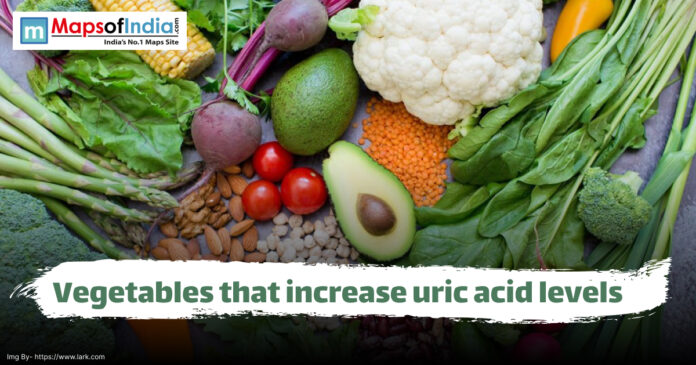Uric acid is a waste product created when your body breaks down purines, which are found in many foods. High levels of uric acid in your blood can lead to a painful condition known as gout, where joints become inflamed and sore. If you’re dealing with high uric acid levels or gout, it’s important to watch what you eat. Some vegetables and foods can make the problem worse.
List of Vegetables That Increase Uric Acid Levels
-
Spinach
Spinach is a highly nutritious leafy green that’s packed with vitamins and minerals. However, it’s also rich in purines. When your body breaks down purines, it produces uric acid. If you have high uric acid levels or gout, you should try to limit how much spinach you eat. This doesn’t mean you have to cut it out completely, but moderation is important.
-
Asparagus
Asparagus is a nutritious vegetable with various health benefits but contains purines that can affect uric acid levels. While it offers vitamins and antioxidants, consuming large amounts may contribute to higher uric acid, especially if you’re managing gout or elevated uric acid levels. To maintain control, consider eating asparagus in moderation. Balancing your diet with low-purine foods and monitoring portion sizes can help manage your condition effectively. Always consult with a healthcare provider for tailored dietary recommendations.
-
Cauliflower
Cauliflower is a nutritious and versatile vegetable, but it contains purines, which can impact uric acid levels. Like spinach and asparagus, it’s best to consume cauliflower in moderation if you’re managing uric acid levels. While it offers many health benefits, including vitamins and fiber, balancing your intake with other low-purine foods is important for maintaining optimal health. Always consider individual dietary needs and consult with a healthcare provider for personalized advice on managing purine consumption.
-
Mushrooms
Mushrooms are a good source of various nutrients, but they are also relatively high in purines. If you’re trying to keep your uric acid levels in check, you should be careful with how much mushroom you consume.
-
Peas
Peas are a popular vegetable known for their nutritional benefits, including vitamins and fiber. However, they are also high in purines, which can impact uric acid levels. If you’re managing conditions like gout or high uric acid, it’s important to limit your intake of peas. Moderation is key to balancing their health benefits with their purine content. Incorporating a variety of low-purine vegetables into your diet can help maintain optimal uric acid levels while still enjoying a diverse range of nutrients.
-
Lentils
Lentils are a type of legume that is full of nutrients and a good protein source. However, they contain purines as well. If you have high uric acid levels, you should be cautious about how many lentils you eat.
-
Beans
Different kinds of beans, including kidney beans, black beans, and navy beans, are also high in purines. If you’re dealing with high uric acid levels or gout, it’s better to limit your consumption of these beans to avoid worsening the condition.
-
Dried Fruits
Dried fruits like apricots, raisins, and prunes are sweet and convenient but are also high in natural sugars. Eating too many dried fruits can lead to weight gain, which is another factor that can raise uric acid levels. While not vegetables, it’s still important to be mindful of your dried fruit intake.
-
Avocado
Avocados are rich in healthy fats, vitamins, and minerals, making them a nutritious choice. However, they also contain fructose, a type of sugar that can contribute to elevated uric acid levels. For individuals prone to gout or managing high uric acid, it’s wise to limit avocado consumption. While avocados offer numerous health benefits, their fructose content may exacerbate uric acid issues if consumed in excess. Moderation is essential to balance the benefits of avocados with their potential impact on uric acid levels. Consulting with a healthcare provider can help you manage your diet effectively while enjoying avocados in reasonable amounts.
-
Kale
Kale is beneficial for managing uric acid levels due to its nutritional profile. It is low in purines, which are compounds that break down into uric acid and can contribute to conditions like gout. By consuming foods low in purines, such as kale, individuals can help prevent spikes in uric acid levels. Additionally, kale is rich in antioxidants and anti-inflammatory compounds like vitamin C, beta-carotene, and flavonoids, which can help reduce inflammation and manage symptoms associated with high uric acid. The fiber in kale also supports digestion and overall metabolic health, which can further aid in maintaining balanced uric acid levels. Furthermore, kale’s high content of essential nutrients, including vitamins A, C, and K, and minerals like potassium, contributes to overall health and supports kidney function. This holistic approach to diet, including incorporating kale, can be an effective strategy for managing uric acid levels.
Tips for Managing Uric Acid Levels
-
Maintain a Healthy Weight
Extra weight can increase the risk of high uric acid levels and gout. Losing weight through a balanced diet and regular exercise can help lower uric acid levels and reduce the likelihood of gout attacks.
-
Stay Hydrated
Drinking plenty of water helps flush uric acid out of your body. Aim to drink at least 8 glasses of water a day to stay well-hydrated and support your body in managing uric acid levels.
-
Limit Red Meat
Red meat, such as beef, lamb, and pork, is high in purines. Reducing your intake of red meat can help lower uric acid levels and reduce the risk of gout attacks.
-
Choose Low-Purine Foods
Opt for vegetables that are low in purines, such as broccoli, cabbage, and carrots. These vegetables can provide essential nutrients without significantly increasing your uric acid levels.
-
Consider Lifestyle Changes
In addition to dietary changes, adopting a healthy lifestyle can help manage uric acid levels. Regular exercise, stress management, and getting enough sleep are important factors in keeping uric acid levels stable.
-
Consult a Healthcare Professional
Everyone’s body reacts differently to various foods and lifestyle changes. If you’re concerned about your uric acid levels or managing gout, it’s best to consult with a healthcare professional. They can provide personalized advice based on your individual health needs and help you create a plan that works best for you.
In summary, managing high uric acid levels involves being mindful of your diet and making informed choices about the foods you eat. By limiting high-purine vegetables, staying hydrated, maintaining a healthy weight, and making positive lifestyle changes, you can help control your uric acid levels and reduce the risk of gout attacks.





